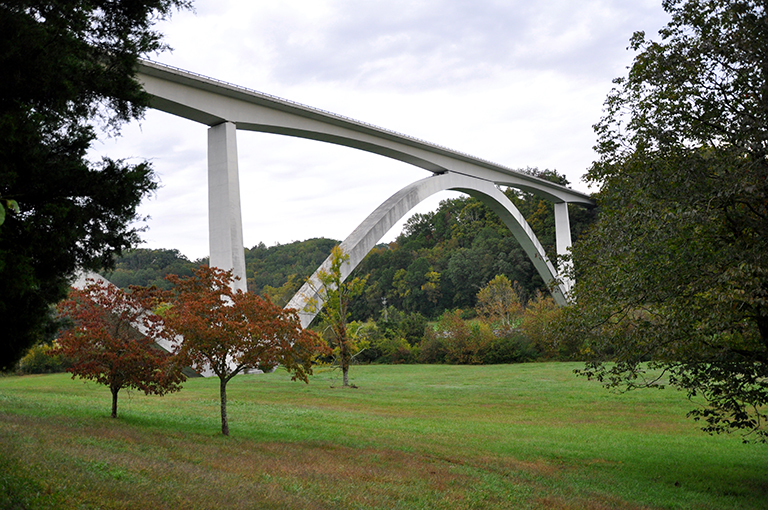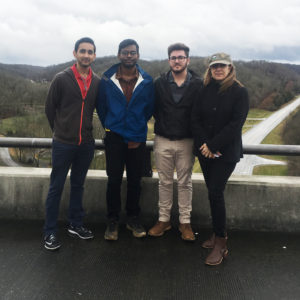
The Natchez Trace Bridge in Williamson County is an icon of the parkway. Photo provided by the National Park Service.
Editor’s Note: Signs of suicide include talking about death, a sudden loss of interest in activities or social interaction, increased use of alcohol or drugs, or a sense of hopelessness. If you or someone you know exhibit these symptoms, contact the National Suicide Prevention Hotline at 800-273-TALK (8255) or the Crisis Text Line (Text TN to 74174).
The Natchez Trace Parkway Bridge, a concrete double-arch bridge outside Franklin, Tennessee, famous for its architecture and sweeping views, has gained a reputation in recent years for its use in suicides.
At least 32 people have died after jumping from the bridge, according to the Williamson County Sheriff’s Office. The most recent death occurred on New Year’s Eve in 2018.
Answering a request from Trish Merelo with the Natchez Trace Bridge Barrier Coalition, Jenny Retherford, CEE senior lecturer, established a senior design project aimed at developing barriers on the bridge.

From left: Senior Deisgn students Meet Patel, Jay Thota, and Connor Campbell stand with Trish Morelo, co-founder of the Natchez Trace Bridge Coalition.
“Civil engineering, at its core, is all about serving for the betterment of humanity,” Retherford said. “What could be more perfect for that than quite literally preventing suicides?”
Retherford’s team of students face a number of challenges due to the bridge’s location in a national park. Any change to the bridge must conform with park rules mandating design, materials, changes to aesthetics, and even the feeling it evokes when viewed. The students started the project in the spring semester and work will extend through the fall semester.
Tennessee State Representative Sam Whitson, whose district includes the bridge, recently introduced legislation aimed at loosening National Park Service rules so the bridge could be altered. That legislation passed through the Tennessee House of Representatives on March 14 and is now headed to the state Senate.
—Nancy Abdo, Senior Design team member
In addition to Abdo, the team includes students with concentrations in structures, construction management, transportation, and water resources. The students have recruited a team of mentors from the Federal Highway Administration and the Tennessee Department of Transportation who will provide valuable guidance as they move into the technical engineering work.
Merelo was led to create the Natchez Trace Bridge Barrier Coalition after her son John died at the bridge in January 2016. The people he left behind had seen few warning signs: he was a good student, didn’t miss school, and had landed a scholarship to the University of Alabama.
“He had told me he had symptoms of depression, but he’d told me he’d let me know when he was feeling down,” Merelo said during a visit to UT. “When I woke up that morning and he wasn’t at the house, I knew. I just knew.”
Morelo learned about the other instances at the bridge, and that the bridge’s design played a role in its grim reputation.
“Barriers are the only way to prevent people from jumping from bridges,” Merelo said.
Contact
David Goddard: 865-974-0683, david.goddard@utk.edu